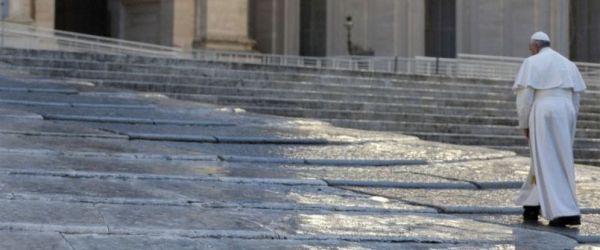In the life of the Christian there is a "double testimony": that of the Spirit who "opens the heart" by showing Jesus, and that of the person who "by the power of the Spirit" proclaims "that the Lord lives". A testimony, the latter, to be borne "not so much with words" but with "life", even at the cost of "paying the price" of persecution.
Once again, the Holy Spirit and his action in the heart of every believer were the focus of Pope Francis' meditation during the Mass celebrated at Santa Marta on Monday 2 May. The liturgy continues to offer passages from the Acts of the Apostles (16, 11-15) with the first missions of the nascent Church and excerpts of Jesus' discourse during the Last Supper (John, 15, 26 - 16, 4). In particular, in the Gospel of the day we read of Jesus who "speaks of the witness that the Holy Spirit, the Paràclito, will give of him and of the witness that we must also give of him". And Francis emphasised that here the "strongest" word is precisely "witness".
The testimony of the Spirit is also found in the first reading where, while speaking of Lydia, a "purple merchant from the city of Thyatira, a believer in God", it says: "The Lord opened her heart to adhere to Paul's words". But "who touched this woman's heart?" the Pontiff asked himself, recalling that Lidia "felt within herself" something that moved her to say: "This is true! Do I agree with what this man says, this man who bears witness to Jesus Christ'? The answer is "the Holy Spirit". It is he 'who made this woman feel that Jesus was the Lord; he made this woman feel that salvation was in Paul's words; he made this woman feel a testimony'.
It is therefore, the Pope explained, the Spirit who 'bears witness to Jesus. And every time we feel something in our hearts that brings us closer to Jesus, it is the Spirit working within'. Jesus himself explained the action of the Spirit to the disciples: 'He will teach you and remind you of all that I have said'. And the Spirit, Francis added, 'continually opens the heart, as he opened the heart of this lady Lydia', and 'gives witness to hear and remember what Jesus taught us'.
But the testimony, the Pope explained, 'is twofold'. In other words, 'the Spirit gives us the testimony of Jesus and we bear witness with the power of the Spirit of the Lord himself'. Jesus reiterates this again in the Gospel passage: 'When the Paràclito comes, whom I will send to you from the Father, the Spirit of truth, who proceeds from the Father, he will bear witness of me; and you also bear witness, because you are with me from the beginning'. And the Lord, Francis pointed out, insists on the characteristics of this testimony - "perhaps the disciples did not understand well," he observed - adding: "I have told you these things so that you will not be scandalised". He explains, that is, "the price of Christian witness" in a direct manner: "They will drive you out of the synagogues; indeed, the hour is coming when whoever kills you will believe that he is worshipping God".
Therefore, the Pontiff summarised, "the Christian, with the strength of the Spirit, bears witness that the Lord lives, that the Lord is risen, that the Lord is among us, that the Lord celebrates with us his death, his resurrection, every time we approach the altar"; and he does so "in his daily life, with his way of acting". It is, he added, 'the continuing witness of the Christian'. At the same time, the Christian must be aware that sometimes this testimony "provokes attacks, provokes persecutions": they are "the small persecutions", such as those of "gossip" and "criticism", but also the persecutions of which "the history of the Church is full", that is, those that lead "Christians to prison" or "even to giving their lives".
It is therefore the same 'Holy Spirit who made Jesus known to us' who urges us 'to make him known, not so much with words, but with the witness of life'. And, the Pope suggested in conclusion, 'it is good to ask the Holy Spirit to come into our hearts, to bear witness to Jesus' and to pray to him like this: 'Lord, may I not turn away from Jesus. Teach me what Jesus taught. Let me remember what Jesus said and did and, also, help me bear witness to these things. May worldliness, the easy things, the things that come precisely from the father of lies, from the prince of this world, sin, not turn me away from witnessing; may I not be scandalised, as Jesus says, to be a Christian because someone avoids me or there are persecutions."
[Pope Francis, S. Marta homily, in L'Osservatore Romano 02-03/05/2016]












